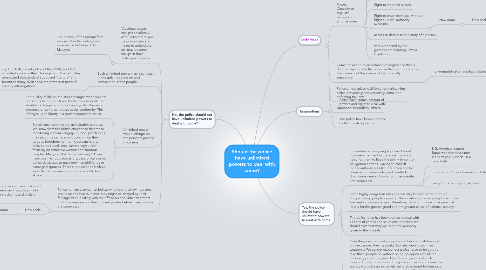
1. No, the police should not have unlimited powers to deal with crime?
1.1. "Absolute power corrupts absolutely." With unlimited power, the police- who are meant to uphold the law, may become corrupt in their dealings with crime.
1.1.1. The erosion of their moral fibre may result in the widespread acceptance of bribes. E.G. In Malaysia
1.2. Such unlimited power may also result in the unfair oppression and prosecution of the people.
1.2.1. eg. The KGB, secret police of the USSR, wielded unlimited power in their dealings with "crime". They prosecuted thousands of supposed "traitors" and terrorized many civilians on the pretext of national security interrogations.
1.3. Unlimited power would infringe on the personal privacy of citizens
1.3.1. The quality of life on the street changes when you are constantly being monitored by the government. The street is no longer a refuge of anonymity. The mere presence of cameras induces social conformity. This infringes upon liberty in a most fundamental sense.
1.3.2. Surveillance cameras are an invitation to abuse. We know from the British experience that those monitoring cameras engage in racial profiling as they pivot the cameras and zoom in on their targets. Boredom monitoring screens is often relieved by surveillance camera voyeurism: focusing on attractive women and amorous couples. Many call this "video stalking." There have been various reports of police officers using police databases to track down ex-girlfriends or estranged spouses. There's no reason to believe surveillance cameras would be subject to less abuse.
1.4. Policemen are also human beings who have their own personal prejudice and biases, hence they might be swayed by their feelings when dealing with the offenders and unfair treatment might be imposed on the innocent parties before investigations are completed.
1.4.1. Everyone has their own rights, no one should have unlimited powers when dealing with someone else. The police might abuse their powers and hurt people's dignity and pride or harm them physically.
1.4.2. New node
1.4.2.1. New node
1.4.2.1.1. New node
2. Definitions
2.1. Power: Capacity to regulate behavior and enforce order
2.1.1. Surveillance: CCTV, Satellite tracking
2.1.2. Right to bearing and usage of arms
2.1.3. Right to detainment without trial
2.1.4. Right to stop and search
2.1.5. Right to enter premises, without higher judicial authority (warrants)
2.1.5.1. New node
2.1.5.1.1. New node
2.1.6. access to datebase or history of a person
2.1.7. well-supported by the government (funding, laws & legislation)
2.2. Crime: an action or an instance of negligence that is deemed injurious to the public welfare or morals or to the interests of the state and that is legally prohibited.
2.2.1. a wrongdoing/ an act that violates the law
2.3. Police:an organized civil force for maintaining order, preventing and detecting crime, and enforcing the laws.
2.4. Unlimited: boundless; infinite
3. Yes, the police should have unlimited powers to deal with crime.
3.1. In countries where gang fights and street riots are a frequent occurrence, there is a need for them to have the ability to control belligerent citizens. Having to consult higher authorities befire any action can be taken might cause delay and resulted in dire consequences from arising. (eg deaths and casualties).
3.1.1. E.G. American rapper Tupac was shot four times in Las Vegas, Nevada, in a gang fight.
3.1.2. Street riots: Riots in Tunisia and Malaysia
3.1.3. Gang fights: Singapore, America
